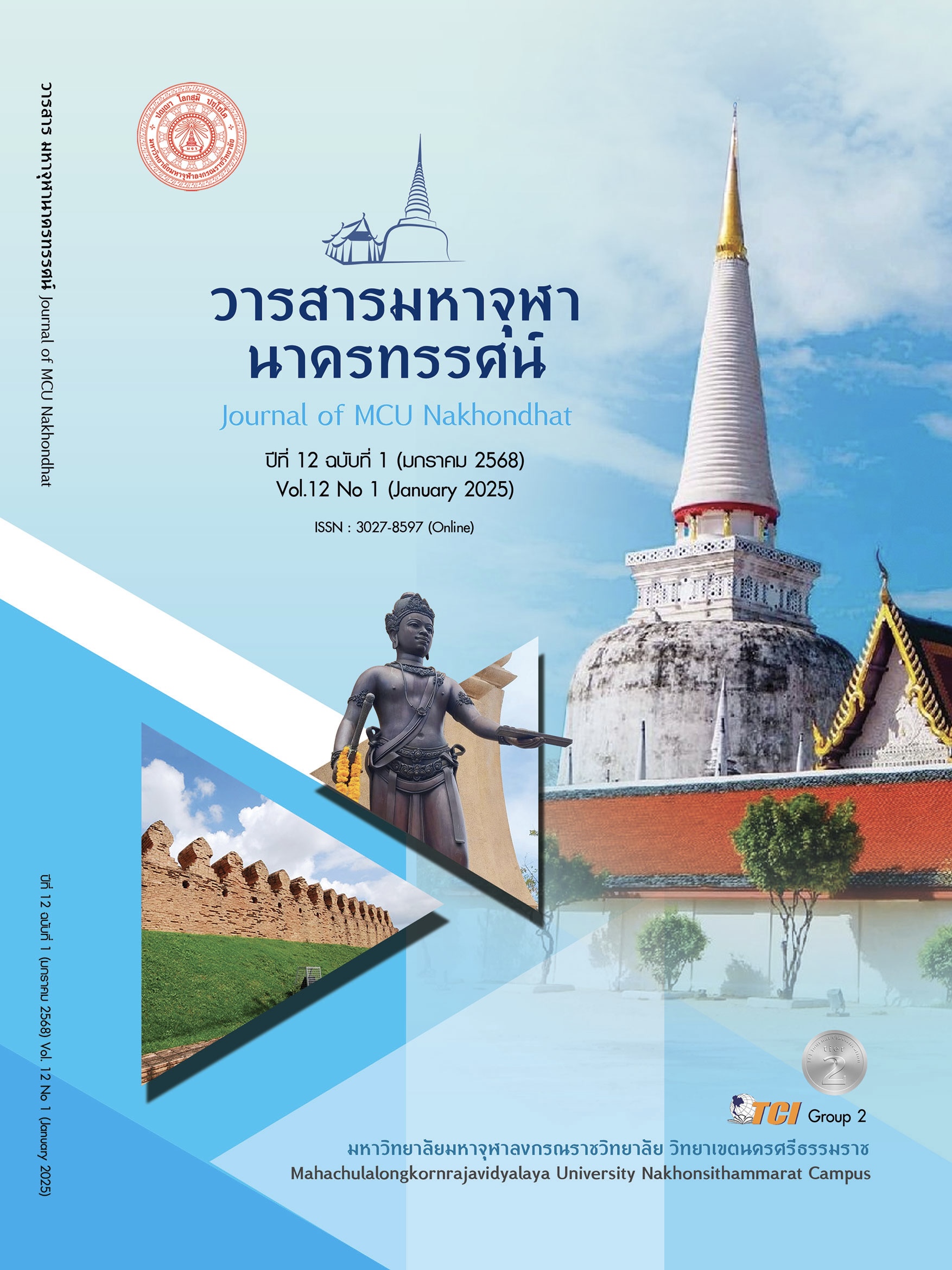THE USE OF ARTIFICIAL INTELLIGENCE (AI) APPLICATIONS FOR VOCABULARY LEARNING AMONG THAI UNIVERSITY STUDENTS: A CASE STUDY
Main Article Content
Abstract
This study aimed to explore the use of artificial intelligence applications in vocabulary learning among university students, to study the frequency and patterns of use, and to analyze their attitudes and opinions toward vocabulary learning applications. This was a classroom research study using questionnaires and asking for the cooperation of business English major students. Data collection was conducted in April 2024. Out of 40 students, 31 (72.22%) participated in the study, all of whom provided informed consent to participate in the study. The collected data were statistically and content-based analyzed. The results showed that AI applications were widely used among this group of students. In terms of vocabulary learning, the majority of students, 83.80 percent, regularly used these tools. This proportion demonstrates the important role of these AI applications in daily learning routines. The data also indicated that AI tools were mostly used to find new words, practicing pronunciation, and understand words that often appear together, collocation, which showed its effectiveness in enhancing the language learning process. In addition, students expressed positive attitudes towards the AI application, citing its convenience, speed, and effectiveness in developing language skills. Most students were aware of the need to verify the accuracy of the data or answers provided by AI, and teachers still play a role in advising students on their learning. However, there were also concerns about its reliability and the need for supplementary traditional learning methods. Overall, this study contributes to the understanding of how AI technologies are used in language education contexts, highlighting the benefits and challenges as perceived and viewed by Thai university students.
Article Details

This work is licensed under a Creative Commons Attribution-NonCommercial-NoDerivatives 4.0 International License.
References
ณัฐสุดา สิทธิชัย และคณะ. (2564). การจัดการเรียนรู้คำศัพท์ภาษาอังกฤษโดยใช้แอปพลิเคชัน Duolingo ประกอบการสอนนักเรียนชั้นประถมศึกษาปีที่ 4 โรงเรียนบ้านนาสีสลากกินแบ่งสงเคราะห์ที่ 59 อำเภอเชียงคาน จังหวัดเลย. วารสารครุศาสตร์ มหาวิทยาลัยราชภัฏเลย, 15(2), 9-17.
รมณียา สุรธรรมจรรยา. (2558). ผลการใช้แอพพลิเคชั่นสำหรับสอนคำศัพท์ภาษาอังกฤษบนแท็บเล็ตวิชา ภาษาอังกฤษสำหรับนักเรียนชั้นประถมศึกษาปีที่ 2 สังกัดสำนักงานเขตพื้นที่การศึกษาประถมศึกษาราชบุรี เขต 2. ใน วิทยานิพนธ์ครุศาสตร์มหาบัณฑิต สาขาเทคโนโลยีการศึกษา. มหาวิทยาลัยศิลปากร.
อนันต์ ผลเพิ่ม. (2567). AI กับบทบาทสำคัญต่อ มหาวิทยาลัยไทย: กรณีศึกษามหาวิทยาลัยเกษตรศาสตร์. ใน การประชุมวิชาการ สำนักหอสมุด มหาวิทยาลัยเกษตรศาสตร์ ประจำปี 2567. กรุงเทพมหานคร: มหาวิทยาลัย เกษตรศาสตร์.
Alammar, A. A. & Amin, A. E. (2023). EFL students’ perception of using AI paraphrasing tools in English language research projects. Arab World English Journal, 14(3), 166-181.
Aljuaid, H. (2024). The Impact of Artificial Intelligence Tools on Academic Writing Instruction in Higher Education: A Systematic Review. Arab World English Journal (AWEJ) Special Issue, 2024 (Special Issue), 26-55.
Alqahtani, M. (2020). The Effect of Artificial Intelligence on English Language Learning. Journal of Language Teaching and Research, 11(2), 139-146.
Bengio, Y. et al. (2024). Managing extreme AI risks amid rapid progress. Science, 384(6698), 842-845.
Computing for Geeks. (2023). How AI is transforming language learning technology. Retrieved August 3, 2024, from https://computingforgeeks.com/how-ai-is-transforming-language-learning-technology/
Fajaruddin, S. et al. (2024). Technology's impact on language learning: Meta-analysis on variables and effectiveness. Journal of Education and Learning (EduLearn), 18(2), 512-525.
Fraser, C. A. (1999). The Role of Consulting a Dictionary in Reading and Vocabulary Learning. Canadian Journal of Applied Linguistics, 2(2), 73-89.
Granić, A. & Marangunić, N. (2019). Technology acceptance model in educational context: A systematic literature review. British Journal of Educational Technology, 50(5), 2572-2593.
Johnson, M. et al. (2016). Connected to learn: Teachers' experiences with networked technologies in the classroom. Ottawa: Canadian Teachers’ Federation.
Kurniati, E. Y. & Fithriani, R. (2022). Post-graduate students’ perceptions of Quillbot utilization in English academic writing class. Journal of English Language Teaching and Linguistics, 7(3), 437.
Lian, A-P. & Joy, B. K. (1983). The butcher, the baker, the candlestick maker: Some uses of dialogue generators in computer-assisted foreign language learning. Australian Review of Applied Linguistics, 6(2), 60-71.
Nation, P. (2001). Learning Vocabulary in Another Language. Cambridge: Cambridge University Press.
Pedró, F. et al. (2019). Artificial intelligence in education: Challenges and opportunities for sustainable development (Working papers on education policy, No. 7). France: UNESCO.
Salaberry, M. R. (2001). The use of technology for second language learning and teaching: A retrospective. Modern Language Journal, 85(1), 39-56.
Schmitt, N. (2019). Understanding vocabulary acquisition, instruction, and assessment: A research agenda. Language Teaching, 52(2), 261-274.
Shin, M. H. (2018). How to use artificial intelligence in the English language learning classroom. Indian Journal of Public Health Research & Development, 9(9), 557-561.
Skakovskyi, I. (2021). AI in Language Learning: Changing the Way We Learn. Retrieved September 2, 2024, from https://riseapps.co/ai-in-language-learning/
Thornbury, S. (2002). How to teach vocabulary. Malaysia: Pearson Education Limited.
Wei, L. (2023). Artificial intelligence in language instruction: impact on English learning achievement, L2 motivation, and self-regulated learning. Frontiers in psychology, 14(2023), https://doi.org/10.3389/fpsyg.2023.1261955
Zhang, S. et al. (2021). The effects of dictionary use on second language vocabulary acquisition: A meta-analysis. International Journal of Lexicography, 34(1), 1-38.


